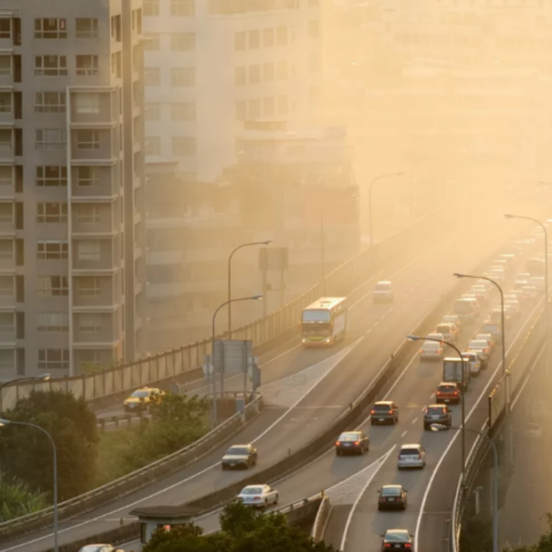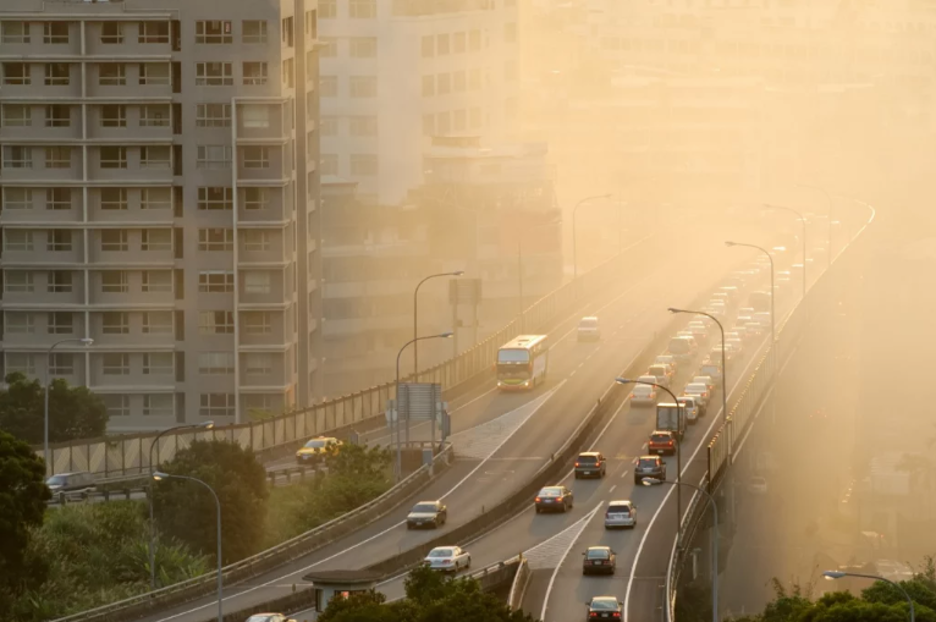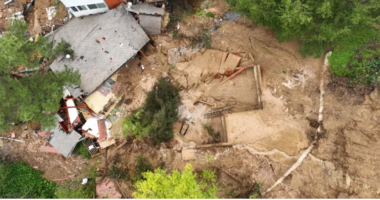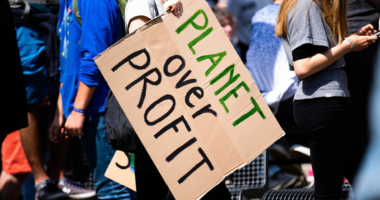Climate, Health and Equity Brief
Displacement, pollution, and environmental injustice in the U.S.
February 26, 2024

The Climate, Health & Equity Brief is GMMB’s take on the latest news on the current impacts of climate change. If you haven’t subscribed yet, you can do so by clicking here.
Hot Topic: Unhealthy, uprooted & uninsured. Three new reports out this week underscore the increasing impact of climate-fueled air pollution in America. According to one study, 14 million U.S. households now experience at least one week of “unhealthy” air every year as wildfire-fueled pollution erodes air quality improvements that strengthened EPA regulations achieved in the early 2000s.
Two additional studies highlight the outsized impacts of unhealthy air on low-income communities and communities of color. The American Lung Association found that widespread EV adoption could avoid nearly 3 million asthma attacks and hundreds of infant deaths annually, particularly among communities overrepresented in neighborhoods close to highways and major thoroughfares. Underscoring data from over 200 other American cities, additional research shows that Denver communities of color—notably Hispanic/Latino, American Indian and Alaskan Native populations—were found to experience the highest levels of air pollution compared to their racial counterparts.
Also threatening the U.S. population is extreme weather and the resulting insurance crisis. The U.S. experienced 28 extreme weather disasters last year that cost at least $1 billion each—forcing 2.5 million Americans from their homes, according to the U.S. Census Bureau. Of those displaced, more than a third experienced at least some food shortage, more than a third were displaced for longer than a month, and more than half reported being approached by someone attempting to take advantage of their situation and defraud them.
Though some acknowledge limitations in the data, it is considered a major step forward and the clearest picture yet in assessing the number of Americans displaced by the impacts of climate change. The findings also revealed that Black people and Latinos are displaced most often, and poorer people tend to be displaced for longer. For those who also identify as LGBTQ+, the effects of displacement are amplified.
The changing climate is not only displacing people from their homes, it is also driving an insurance affordability crisis. As extreme weather becomes more frequent and severe, insurance companies are demanding higher premiums and abruptly abandoning risky areas and canceling or failing to offer new policies in states such as California and Florida, with predictions that insurance crises in more states are sure to come.
Human Health
According to new data from the U.S. Census Bureau, 2.5 million Americans were forced from their homes due to weather-related events in 2023, with more than a third displaced for over a month. (The New York Times)
A new First Street study found an uptick in hazardous air days in the U.S. following early 2000s improvements, with 14 million American households now experiencing at least one week of EPA-designated “unhealthy” air each year and climate-fueled wildfires identified as the primary culprit. (The Verge)
Torrential downpours and deadly floods in California have created an “astonishing” increase in illnesses such as valley fever, a fungal disease that can cause severe illness in humans for which the highest number of cases in history was recorded in 2023 and an even greater risk is predicted for 2024. (Wired, Inside Climate News)
Planetary Health
In Japan, over 480 high-temperature records were broken nationwide in just three days—some by as much as 10.8°F—as historic winter heat waves have plagued the country, shocking forecasters in Japan and weather record trackers around the world. (Axios)
New research shows that Louisiana has seen a “sudden burst in sea level rise” over the past 13 years—a surge not expected until later this century—leading to seas rising faster than wetlands can grow and putting cities near the ocean at increased risk from storms. (The Washington Post)
Scientists continue to sound the alarm that the Amazon faces a tipping point by 2050 due to water stress, land clearance, and climate disruption, which threaten to transform parts of the rainforest into savanna and render it a carbon emitter rather than a carbon sink without urgent protective action. (The Guardian)
Animal sanctuaries across the United States are being forced to relocate due to wildfires, flooding and extreme heat that threaten the well-being of rescued animals, prompting a search for elevated and better-drained lands to ensure their safety and recovery. (The New York Times)
New research has shown that reforestation in the eastern U.S. has helped lower temperatures in the region by 1.8°F to 3.6°F each year and by as much as 9°F on the hottest days in summer. (The Guardian)
Equity
A new study from the American Lung Association shows that widespread electric vehicle adoption could prevent nearly 3 million asthma attacks and hundreds of infant deaths annually, particularly among communities of color and low-income populations, who disproportionately live in neighborhoods in close proximity to highways and major thoroughfares. (Grist)
A new study shows that over the next few decades, climate change will cut Africa’s GDP by 7.1%, a change that is expected to slash crop revenue by 30% and leave 200 million Africans facing debilitating hunger. (Bloomberg)
Underscoring existing data from over 200 other cities, new research shows that Denver communities of color—notably Hispanic/Latino, American Indian and Alaskan Native populations—were found to experience the highest levels of air pollution compared to their racial counterparts. (The Hill)
Locusts—which the U.N. has deemed “the most destructive migratory insect in the world”—are experiencing bigger and more serious heat-related outbreaks in Africa, the Middle East, and South Asia, with a square kilometer swarm only needing one day to destroy crops for 35,000 people. (AP)
Politics & Economy
The climate-fueled insurance crisis is leaving homeowners struggling to secure affordable coverage as insurers exit high-risk areas and demand higher premiums, prompting concern about the increase in uninsurable properties and raising questions about long-term societal impact. (Financial Times)
Leading financial firms are reversing their pledges to fight climate change and pulling out of climate coalitions like Climate Action 100+ out of concern about escalating legal risks and political attacks from Republican lawmakers. (The New York Times)
Government incentives and subsidies have led to more risk-tolerant private investment, creating an influx of capital that is buoying the climate technology industry and helping startups survive to profitability. (POLITICO)
New research has found that the single most productive factor in influencing private-sector decarbonization was state policy initiatives, demonstrating the importance of the Inflation Reduction Act’s cooperation with local and state-level policies. (The Hill)
The recent repeal of two clean energy programs by the newly Republican-led utility commission in Arizona is a major reversal from the commission’s intent to pass a 100% clean energy mandate just a few years ago, demonstrating the deep political divisions on energy policy and their impact at the state level. (E&E News, POLITICO)
Action
New York, New Jersey, and seven other blue states have formed a coalition that pledges to replace fossil fuel furnaces with heat pumps, an effort widely seen as a key solution to curbing climate change. (Inside Climate News)
The city of Chicago filed a lawsuit against five major oil companies and the American Petroleum Institute, alleging 11 counts of fraud, nuisance, conspiracy and negligence and asking the court to hold them responsible for the costs of climate change. (Chicago Sun-Times)
The James Beard Foundation launched a new campaign—Climate Solutions for Restaurant Survival—to address the threat of climate change on the independent restaurant industry and push for federal action to mitigate climate change. (Dallas Morning News)
Life as We Know It
Ski resorts are working to improve the efficiency of their snowmaking operations by deploying greener technologies that reduce their energy usage as climate impacts from continued warming make the industry more reliant on artificial snow. (Grist)
Kicker
Curious about the environmental risks to your home? This online tool from First Street’s Risk Factor can identify the climate risks of any U.S. property, including proximity to toxic pollution and risks and comparative rankings for heat, flooding, wildfires and poor air quality.
Air pollution is turning Mother Nature prematurely gray.”
– Irv Kupcinet
The GMMB Climate, Health & Equity Brief would not be possible without the contributions of the larger GMMB team—Aaron Benavides, Stefana Hendronetto, Nikki Melamed, Sharde Olabanji and Marci Welford. Feedback on the Brief is welcome and encouraged and should be sent to CHandEBrief@gmmb.com.






